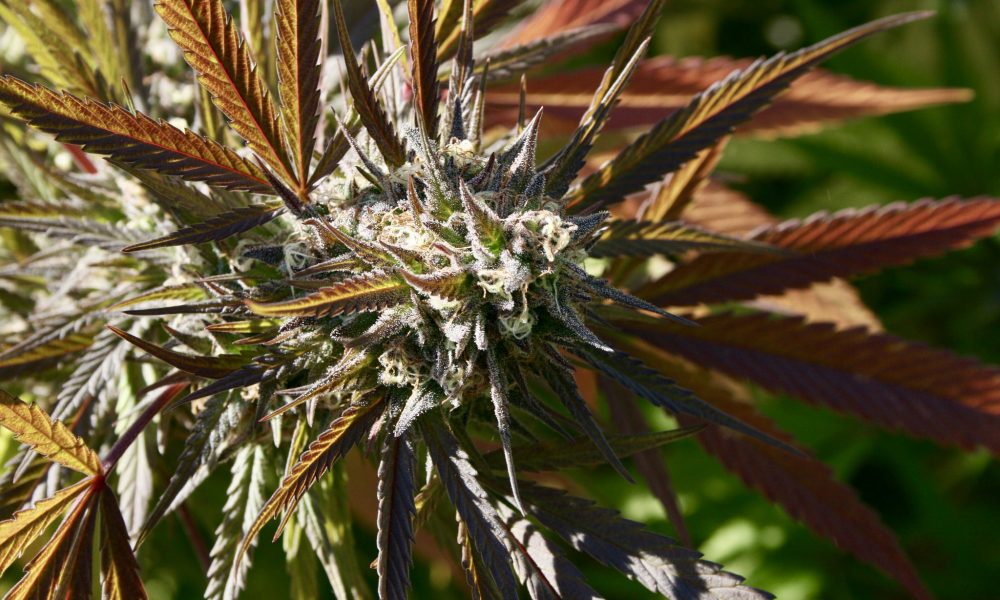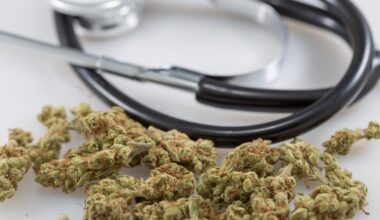A South Carolina House committee on Monday discussed a Senate-passed bill to legalize medical marijuana in the state, with members hearing hours of testimony from a wide range of voices including military veterans and pharmacists.
The House Medical, Military, Public and Municipal Affairs Committee took up the legislation from Sen. Tom Davis (R) one week after a subcommittee voted unanimously to advance it.
The Compassionate Care Act passed the full Senate in February. It was prefiled in late 2020 and passed out of the Senate Medical Affairs Committee last March, but a lone senator blocked it from reaching the chamber floor in 2021. Since then, Davis has redoubled his efforts to get the bill across the finish line, arguing that South Carolina voters are ready what he’s repeatedly called “the most conservative medical cannabis bill in the country.”
Davis used his testimony to address House colleagues’ concerns that had been raised earlier in the hearing, including worries about the possibility of increased impaired driving post-legalization.
“I keep hearing that if we authorize medical cannabis, there’s going to be an increase in impaired driving. We have had the experience at 37 states with this—decades of experience…saying there is a negative correlation between medical cannabis laws and incidents of impaired driving impaired driving goes down, down, unequivocally down.”
He also stressed that lawmakers should remove themselves from the medical process and let patients access a product in consultation with their doctors.
During his impassioned testimony at the close of the hearing, the senator also said that the origin of federal marijuana prohibition goes back to President Richard Nixon’s administration “wanting to get out the war protesters and wanting to stick it to them.”
“This is a medical bill that is so tight—is tighter in terms of the qualifying conditions, is tighter in terms of what you have to demonstrate to a doctor in order to become authorized, is tighter in regard to pharmacists being the ones that dispense it, is tighter in regard to the quality control measures, is tighter in regard to anything you can think of,” Davis said, “because we have had the benefit of eight years of working on this and looking at 37 states that have legalized this and see what’s worked and seeing what hasn’t worked.”
Also at Monday’s hearing, a number of military veterans testified about their own experiences with cannabis treatment, explaining that the pharmaceuticals they were prescribed to treat conditions they attribute to their service led to severe side effects, unlike cannabis.
One veteran who said he served 11 years in the Marine Corps and returned home with PTSD, insomnia and more became “mentally broken” and was near the brink of suicide
“In 2017, exhausted and out of options, I gained access to lab-tested pharmaceutical grade cannabis,” he said. “It removed anger from the equation and stimulated appetite. It allowed for healthy sleep. It facilitated digestion. It provided consistency in moods that allowed for clarity and focus. It reduced the chronic pain. Within three months of integrating cannabis, I was off all the medications prescribed by the [Department of Veterans Affairs].”
“Here’s the sad truth: If I continue to rely on the VA in a western model of medicine, I would not be standing here in front of you today,” he said. “For the first time in my 10-year struggle, I found something that was safe, effective and efficient for me. It was not a gateway. In fact, for me and for so many others, including other Marines, [cannabis was] an exit drug from the addictive pharmaceuticals that were prescribed to us.”
Davis said in January that House Speaker Jay Lucas (R) agreed to “allow the bill to go through the House process” if it advanced through the Senate, but a spokesperson for the speaker later told The Charleston Post and Courier that “Sen. Davis doesn’t speak for Speaker Lucas.” That said, the legislation does now seem to be moving forward in the chamber.
The House subcommittee that advanced the bill last week separately approved another bill last month that was amended to add marijuana to a list of investigational drugs that patients could lawfully access during epidemic or pandemic outbreaks.
Members of the panel also approved an amendment to Davis’s bill to allow podiatrists to recommend medical cannabis if they meet certain requirements. And they adopted a separate amendment making technical corrections and fixing drafting errors in the Senate-passed legislation.
—
Marijuana Moment is already tracking more than 1,000 cannabis, psychedelics and drug policy bills in state legislatures and Congress this year. Patreon supporters pledging at least $25/month get access to our interactive maps, charts and hearing calendar so they don’t miss any developments.![]()
Learn more about our marijuana bill tracker and become a supporter on Patreon to get access.
—
At Monday’s hearing, a representative of of the Koch-funded Americans for Prosperity, who also has a child with autism, said that “we work every day to break the barriers that inhibit individuals from realizing their full potential,” and that includes pushing for an end to cannabis criminalization.
“By really passing medicinal cannabis in South Carolina, it gives us the opportunity to open up therapeutic treatments,” she said, adding that the reform would ensure that “our law enforcement are able to focus on the crimes that are more high, high level crimes.”
Gov. Henry McMaster (R) said in February that it was too early to comment on the proposal, as changes were still being made by lawmakers. “This is one that’s going to depend on a lot of things,” he told a local FOX station, adding that he’ll wait to see the final version before deciding whether he would potentially sign or veto the bill if if were to arrive on his desk.
S. 150 would allow patients with qualifying conditions to possess and purchase cannabis products from licensed dispensaries. Smokable products, as well as home cultivation of cannabis by patients or their caretakers, would be prohibited. Simply possessing the plant form of cannabis could be punished as a misdemeanor.
Qualifying conditions for medical cannabis include cancer, multiple sclerosis, epilepsy, glaucoma, Crohn’s disease, sickle cell anemia, ulcerative colitis, cachexia or wasting syndrome, autism, nausea in homebound or end-of-life patients, muscle spasms, post-traumatic stress disorder (PTSD). Terminal patients with less than a year to live would also qualify. However, regulators would be authorized to add additional conditions in the future.
The bill would also allow access among patients with “any chronic or debilitating disease or medical condition for which an opioid is currently or could be prescribed by a physician based on generally accepted standards of care,” for example severe or persistent pain.
Medical marijuana would be subject to the state’s six percent sales tax, and local jurisdictions would be able to levy an additional tax.
Rather than have conventional medical marijuana dispensaries that are in place in other legal states, the bill stipulates that there would be so-called cannabis pharmacies. The facilities would be required to have a pharmacist on site at all times, and the South Carolina Board of Pharmacy would promulgate business regulations.
People with felony-level drug convictions would also be prevented from participating in the new industry for a period of 10 years under the proposal.
In-state businesses would also receive licensing priority when the market in established, with the intent being to prevent multi-state operators from dominating the industry.
Under the bill, 75 percent of tax revenue after expenditures would go to the state’s general fund, with another 10 percent going to drug use disorder treatment service providers, five percent going to state law enforcement, and the remainder going to cannabis research and drug education.
For the initial rollout, regulators would approve 15 cannabis cultivators, 30 processing facilities, a cannabis pharmacy for every 20 pharmacies in the state, five testing laboratories and four cannabis transporters. Lawmakers, rather than regulators, would be authorized to approve additional license types.
Local governments could ban medical cannabis businesses from operating in their jurisdictions under the amended bill, but otherwise the it says that local land use and zoning burdens “should be no greater for a cannabis-based business than for any other similar business.”
The state Department of Health and Environmental Control would oversee licensing and other regulations of the new industry. A newly established Medical Cannabis Advisory Board would be in charge of adding or removing qualifying conditions. The board would meet at least once per year and be led by a governor-appointed chairperson.
Davis has championed medical marijuana in South Carolina since 2014, and at a rally earlier this year, he brought out a binder that he said contained eight years of research into the issue. He said he would use the information to “take on every single argument that has been raised in opposition to this bill, and I’m going to show that they cannot stand in the way of facts and evidence.”
He’s also continued to push back against opposition to cannabis legalization from his own party, for example calling out an attack ad that was paid for by the South Carolina Republican Party.
The state GOP organization separately slammed a federal legalization bill from U.S. Rep. Nancy Mace, a Republican who represents South Carolina in Congress.
A former White House chief of staff under President Donald Trump also recently called out his home state South Carolina Republican Party for opposing the medical marijuana bill medical marijuana. Mick Mulvaney, Trump’s top aide for more than a year and a former congressman, called the legislation “something that merits discussion and reasoned analysis,” even if it’s not a proposal that is conventionally considered a conservative priority.
Davis referred to the maneuvers by his own party as “the elephant in the room” on the Senate floor as debate on the floor kicked off in January, saying he was offended by the misinformation and planned to rebut every misleading claim the group made.
“I’m going to go through every single legal argument that’s been put up there—lack of medical evidence, unintended social consequences—and take them all up and discuss them and refute them,” the senator said at the time.
A poll released last February found that South Carolina voters support legalizing medical marijuana by a five-to-one ratio. But the state does not have a citizen-led initiative process that has empowered voters in other states to get the policy change enacted.
Support for medical marijuana legalization among South Carolina residents has been notably stable, as a 2018 Benchmark Research poll similarly found 72 percent support for the reform, including nearly two-thirds (63 percent) of Republicans. Davis said last year that if the legislature didn’t advance the reform, he’d propose a bill to put the question of medical marijuana legalization to voters through a referendum.
Also in 2018, 82 percent of voters in the state’s Democratic primary election voted in favor of medical cannabis legalization in a nonbinding ballot advisory vote.
Lawmakers prefiled four marijuana measures for the 2019 session, but they did not advance.
Maryland Lawmakers Discuss Senate-Passed Bill To Fund Psychedelics Research And Access For Veterans
Photo courtesy of Brian Shamblen.
Medical Disclaimer:
The information provided in these blog posts is intended for general informational and educational purposes only. It is not a substitute for professional medical advice, diagnosis, or treatment. Always seek the advice of your physician or other qualified healthcare provider with any questions you may have regarding a medical condition. The use of any information provided in these blog posts is solely at your own risk. The authors and the website do not recommend or endorse any specific products, treatments, or procedures mentioned. Reliance on any information in these blog posts is solely at your own discretion.







